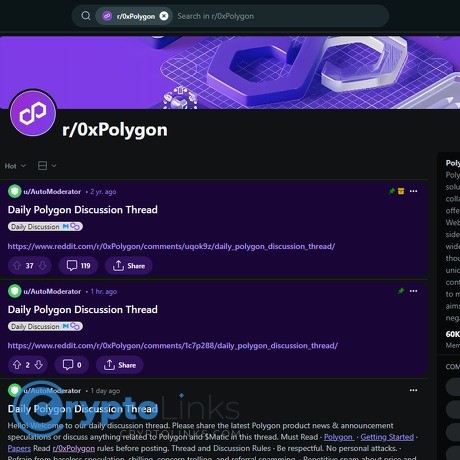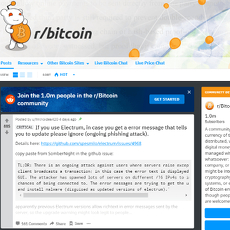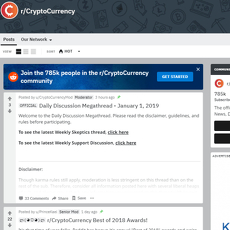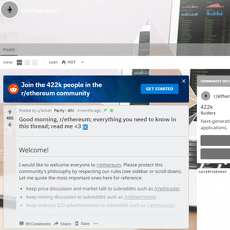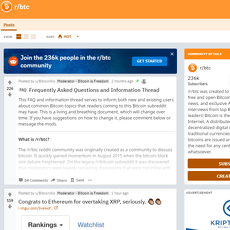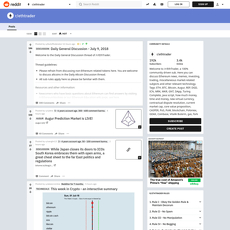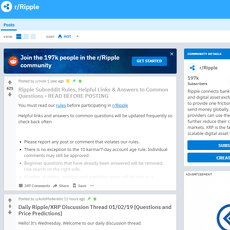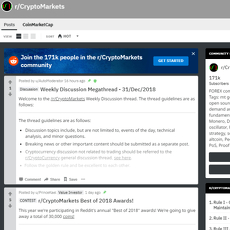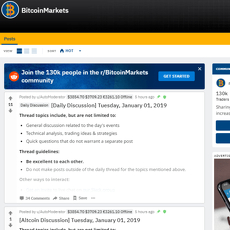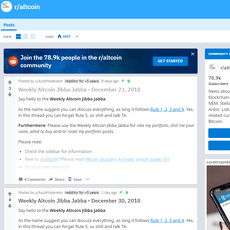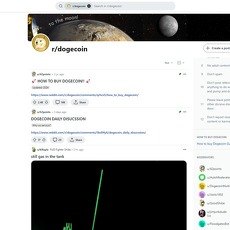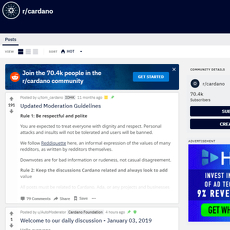r/0xPolygon Review
r/0xPolygon
www.reddit.com
r/0xPolygon Review Guide: How to Use the Polygon Reddit Like a Pro (Answers to All Your Big Questions)
Have you ever opened Reddit to “quickly check” something about Polygon…and 40 minutes later you’re buried in conflicting answers, memes, and people yelling that MATIC is going to $1,000 “any day now”?
If you’re trying to actually use the Polygon network, protect your money, and understand what’s happening with MATIC/POL, Reddit can be either your best friend or your biggest time-waster.
One of the most active hubs for Polygon talk right now is r/0xPolygon. If you use it right, it can help you with real questions like:
- How do I connect Polygon to MetaMask without messing anything up?
- Why is my transaction stuck and what can I realistically do about it?
- Is this POL migration thing something I actually need to act on today?
- Are people genuinely bullish or just shilling bags?
If you use it wrong, you’ll scroll through hype, bad takes, and half-baked advice that might cost you actual money.
The Problem: Polygon Is Huge, Confusing, and Changing Fast
Polygon used to be simple in most people’s minds: “That cheap Ethereum sidechain.” Today, that mental model is outdated.
Now you’ve got:
- Polygon PoS – the chain most people started with
- Polygon zkEVM – a newer, zk-powered scaling solution
- MATIC → POL migration – a major token and governance shift
- New governance and staking mechanics
- Constant protocol upgrades and ecosystem launches
That’s a lot. If you’re new, it’s overwhelming. If you’re experienced but busy, it’s easy to miss critical updates.
The real issue isn’t just complexity, though. It’s how spread out all the important information is:
- Official docs and blog posts
- Twitter/X threads
- Medium articles from random teams
- YouTube tutorials of questionable age and accuracy
- Telegram and Discord screenshots that get reposted without context
So you end up doing this exhausting “research dance”:
- You read an official Polygon blog post.
- You jump to Twitter to see what people are saying.
- You land on a Reddit thread where users say “ignore that, it’s outdated.”
- You open three more tabs to confirm who’s actually right.
Some studies on how people learn complex topics online show that mixing official documentation with community discussion dramatically improves understanding and retention. But that only works if the community space is somewhat organized and you know how to sift signal from noise.
That’s where r/0xPolygon tries to come in: one subreddit that pulls together real user experiences, questions, and updates about Polygon. Not marketing fluff. Not just technical whitepapers. Actual people dealing with real problems.
The catch? It only works for you if you know how to use it strategically.
Promise: This Guide Turns r/0xPolygon Into Your Polygon Cheat Code
Most people treat crypto subreddits like places to scroll and kill time. That’s fine if you just want memes and vibes. But Polygon is a live, evolving network handling billions in value. You want more than vibes.
My goal here is to help you turn r/0xPolygon into a practical tool you can use whenever you need to:
- Get unstuck with a technical problem (MetaMask, bridges, fees, stuck transactions).
- Sense real community sentiment around MATIC/POL, not just official spin.
- Check how other users are handling the MATIC → POL migration on different wallets and exchanges.
- Spot which threads are worth reading and which are just shilling or low-effort speculation.
In plain terms, I want you to be able to open r/0xPolygon with a question in your head and walk away with:
- A clearer understanding of what’s going on.
- At least one actionable next step you can take safely.
- A sense of how other people are handling the same issue.
We’ll look at things like:
- How to use the subreddit to get a straight answer to “How do I actually use Polygon with MetaMask?”
- What people really say when someone asks, “Can Polygon reach $1,000?”
- How to filter comments so you’re not blindly trusting the first loud voice you see.
By the time you’re done with the full guide, r/0xPolygon will stop being “just another crypto subreddit” cluttering your feed and become a go-to tool in your Polygon research routine.
Who This Review Is For
You don’t have to be a hardcore dev or a full-time trader to get value out of r/0xPolygon. In fact, some of the people who benefit the most are the ones who are willing to ask “basic” questions.
This guide will be especially useful if you see yourself in any of these groups:
- New crypto users entering Polygon for the first time
If you’ve just heard that Polygon is “cheap and fast” and now you’re staring at MetaMask wondering why you don’t see your tokens, you’re exactly the kind of person who can benefit from the community’s experience. - DeFi users bridging over for lower fees
Maybe you’re used to Ethereum mainnet, got sick of gas costs, and decided to move to Polygon PoS or zkEVM. You’ll want a place to check what’s working, what’s breaking, and what people are actually using day-to-day. - Traders tracking MATIC/POL price and long-term potential
You’re not expecting Reddit to be your financial advisor, but you do want to know how the crowd is feeling, what narratives are forming, and how people are thinking about market caps and realistic price ranges. - Builders and NFT creators
If you’re launching a project on Polygon, r/0xPolygon can act as an informal focus group. You’ll see what confuses users, what tools they like, and what they complain about with brutal honesty. - Anyone trying to fit Reddit into their Polygon research stack
You already read official docs, maybe track some news sites, and watch a few YouTube channels. You’re now wondering: “Where does Reddit fit in? Is it worth my time?” This guide will help you answer that.
If at least one of those bullets feels like you, you’re in the right place.
How I’ll Break Things Down in This r/0xPolygon Review
Instead of just saying “this subreddit is good” or “this subreddit is bad,” I want to show you how to actually use it for specific goals.
We’ll be taking a look at r/0xPolygon from several angles, for example:
- What the subreddit actually focuses on – Is it more about tech help, news, price, or all of the above?
- How to use it to get real answers fast – The difference between posting a good question and getting ignored.
- Which kinds of posts are worth your attention – And which ones you can safely scroll past without FOMO.
- How to safely research the big topics – MATIC vs POL, realistic price targets, bridging and fees, without betting your money on one random comment.
- A focused FAQ – So you’re not jumping between twenty different tabs to figure out the same three questions everyone asks.
Think of it like this: if Polygon itself feels like a huge city you’re still learning to navigate, r/0xPolygon can be the neighborhood where locals hang out and tell you which streets to avoid, which shortcuts actually work, and which “amazing new restaurant” is just clever marketing.
The key is knowing how that neighborhood is laid out.
So, what exactly is r/0xPolygon? Who runs it, who hangs out there, and what kind of threads will you bump into on your very first visit?
That’s where we’re heading next — and once you see that clearly, everything else starts to click.
What Is r/0xPolygon and What’s the Subreddit Really About?
If you’ve ever typed “Polygon MetaMask not working” or “MATIC to POL what now?” into Reddit, there’s a good chance you’ve seen r/0xPolygon pop up.
Think of this subreddit as a live town square for everything happening on Polygon: the tech, the tokens, the hiccups, the wins, and the “help, I think I just broke something” moments.
It’s not a meme casino, and it’s not a dry developer forum either. It sits right in the middle: real users, real questions, real problems, and usually, real answers.
“The best crypto communities aren’t the loudest ones. They’re the ones that help you fix a mistake at 2 AM without making you feel stupid.”
That’s the kind of energy r/0xPolygon leans toward when it’s at its best.
Basic Overview: The “Polygon Focused” Subreddit
At its core, r/0xPolygon is about one thing: using and understanding the Polygon ecosystem in real life, with real money on the line.
The main themes you’ll see again and again:
- Network questions – “Why is my Polygon transaction pending?” “Gas is super low, is that normal?” “Why is Polygon PoS congested today?”
- MetaMask and wallet setup issues – “How do I add Polygon to MetaMask?” “I bridged from Ethereum but nothing shows up.” “Why do I see USDT on Polygon in the explorer but not in my wallet?”
- Protocol and dApp questions – “Is this DeFi protocol safe?” “Has anyone used this Polygon NFT marketplace?” “What’s the best bridge right now?”
- MATIC → POL and migration talk – “Do I need to do anything?” “Will my exchange handle the swap?” “What about my hardware wallet?”
- General Polygon ecosystem updates – zkEVM milestones, new partnerships, outages, fee changes, governance changes.
If I had to sum up the subreddit’s purpose in one sentence: it feels like a mix between a help desk and a community hangout.
You’ll see someone panicking about a stuck bridge transaction in one thread, and in the next, people casually arguing about whether Polygon will stay competitive once other L2s catch up. There’s a constant back-and-forth between “I need help right now” and “Let’s talk about where this whole ecosystem is going.”
The balance is important. If it were just memes and price spam, it would be useless. If it were just technical jargon, it would be intimidating. Instead, you get a steady stream of:
- Hands-on help for users trying to actually use the network
- Honest feedback about how Polygon feels in day-to-day use
- Ongoing conversation about what’s changing and what it means
That’s why this subreddit ends up being a practical tool instead of just another tab you forget about.
How r/0xPolygon Fits Into the Bigger Polygon Ecosystem
To understand what this subreddit is really good at, you have to place it next to everything else that exists around Polygon.
On one side, you have the official stuff:
- Polygon docs and blog – polished, accurate, but sometimes a few steps behind what users are feeling.
- Discord / Telegram – noisy, chat-based, great for real-time, but chaotic if you’re trying to research something specific.
- Other subreddits like r/PolygonNetwork – more general or older Polygon discussions, sometimes overlapping, sometimes just slow.
r/0xPolygon fits in as the “what’s actually happening for users right now” layer.
Here’s when I personally look there first:
- When I suspect something is wrong – If I notice transactions are slow or a dApp is glitching, I check r/0xPolygon to see if others are reporting the same thing. Often, you’ll see posts like:
- “Anyone else seeing failed swaps on <protocol> today?”
- “Bridge from Ethereum to Polygon stuck at ‘pending’ for 45 minutes…”
- When I want real user feedback – Articles and Twitter threads are nice, but I care about what actual users experience:
- “Is Polygon zkEVM usable yet for normal people?”
- “Best way to stake MATIC/POL in 2025?”
You’ll get blunt answers — both positive and critical — and that’s exactly what you want.
- When there’s a big change or migration – For example, during the MATIC → POL transition, people posted screenshots, specific wallet behaviours, and issues with exchanges long before polished “how-to” articles caught up.
There’s an interesting pattern I’ve seen over and over again, not just here but in other crypto subs too: community posts often surface issues days or weeks before they make it into official announcements or knowledge bases.
Take network congestion events. In most ecosystems, the timeline goes like this:
- Users on Reddit and Discord start complaining: failed tx, long pending times, gas oddities.
- Community members test, compare, and share workarounds.
- Only later do you see a clear, official “post-mortem” or explanation blog post.
r/0xPolygon is part of that early-warning layer for Polygon. It’s where you see the smoke before anyone writes the official “yes, there was a fire” statement.
Who Hangs Out There: The Typical r/0xPolygon User
The mix of people in a community shapes the kind of answers you get. r/0xPolygon isn’t dominated by only devs or only traders, and that’s a good thing.
Here are the main groups you’ll notice:
- Newcomers trying to connect Polygon on MetaMask
These are the “I just bridged and my tokens are gone” or “How do I add Polygon network?” folks.
Threads often look like:
- “I sent USDC from Binance to Polygon, but MetaMask shows zero balance. What did I screw up?”
- “First time using Polygon — can someone explain gas fees in simple terms?”
People usually jump in with step-by-step instructions, screenshots, and links to official tools like Polygonscan to clear things up.
- DeFi and NFT users on Polygon PoS and zkEVM
These users are less confused about basic setup and more focused on optimization and safety:
- “Is <yield farm> still paying out? Any issues withdrawing?”
- “Anyone tried minting NFTs on Polygon zkEVM yet?”
- “Cheapest bridge from Arbitrum to Polygon right now?”
They share experience, not just theory. This is where you’ll see the “I tried it so you don’t have to” type comments.
- Long-term MATIC holders watching POL and the future
These are the people asking:
- “Is it worth holding through the migration?”
- “What happens to staked MATIC when POL is fully live?”
- “Is Polygon still competitive vs other L2s in 2–3 years?”
Discussions here tend to be deeper: tokenomics, governance, security assumptions, even regulatory talk sometimes.
So what’s the general vibe?
- Mostly helpful, with a bit of typical Reddit sarcasm – If you ask “Can Polygon reach $10,000?” expect someone to answer with market cap math and another to drop a meme. But if you ask “I bridged to the wrong network, what can I do?” people usually try to help instead of mocking you.
- Surprisingly patient with “basic” questions – In crypto subs, it’s common to see “go Google it” type replies. On r/0xPolygon, I see more of:
- “Here’s the correct RPC, here’s how to add the token, and here’s why it wasn’t showing up.”
That makes a huge difference if you’re moving money you can’t afford to lose.
- Technical, but not elitist – There are devs and advanced users answering things like “how does zkEVM actually work under the hood?” but they’re often willing to break it down in plain English if you’re honest about being new.
Emotionally, there’s a steady undercurrent of “we’re all trying not to screw this up together.” And in a world where one wrong click can cost hundreds of dollars, that’s exactly the kind of energy you want around you.
First Impression and Layout
Landing on r/0xPolygon for the first time, your experience is shaped by two things: what’s pinned at the top and how easy it is to filter the noise.
Here’s what you’ll typically notice right away:
- Pinned posts – These often include:
- Rules and guidelines
- Major announcements (like POL migration info or big network upgrades)
- Occasional “read this first” type posts for new users
It’s worth taking 2 minutes to skim these before you post. You’ll avoid asking questions that are already answered multiple times and you’ll know what kind of content is unwelcome (like blatant shilling).
- Rules sidebar – On desktop, you’ll see them clearly; on mobile, they’re tucked into the “About” section. Usual themes:
- No scams and fake support
- No low-effort price posts
- Use proper post flairs
Even just reading the rules gives you a sense of what the mods care about: user safety and basic quality.
- Post flairs – These are small labels attached to posts. You’ll see things like:
- [Help] – Wallet issues, stuck transactions, errors
- [News] – Official announcements, partner updates, major changes
- [Discussion] – Opinions, debates, ecosystem conversations
- [MATIC / POL] – Token-related questions, migration, macro thoughts
If you use Reddit’s filter tools to focus on one flair at a time, the sub suddenly feels far less noisy.
For example:
- If you’re panicking about a bridge issue, filter by [Help] and sort by New — you’ll see if others are stuck too and what they tried.
- If you’re researching Polygon’s future, filter by [Discussion] and sort by Top or This month to get the more thoughtful, long-form posts.
The search bar is underrated here. If you type in something like “bridging from Ethereum to Polygon” or “MetaMask not showing tokens”, you’ll often find threads where someone had your exact problem already — along with tested fixes and follow-up comments like “this worked, thanks.”
There’s a psychological comfort in that. When you’re staring at an empty wallet and wondering if you just sent funds into the void, seeing a thread where someone had the same issue and resolved it is a huge relief.
As you scroll through, you’ll notice a pattern:
- Short, urgent help posts with screenshots and wallet errors
- Medium-length discussions where people argue about strategy, tech choices, or Polygon’s future
- Occasional deep-dive posts breaking down things like zkEVM, POL tokenomics, or specific dApps
The structure isn’t perfect, and this is still Reddit, so there’s noise. But with the pinned posts, flairs, search function, and upvote system, you can turn that chaotic feed into a pretty efficient Polygon dashboard — if you know how to look.
And that brings up the real question: once you’ve found the subreddit and got your bearings, how do you actually use it to learn Polygon step by step without risking a costly mistake? That’s where things get interesting in the next part…
Using r/0xPolygon to Actually Learn How Polygon Works
If you’re honest, most “official” blockchain docs feel like they were written by engineers for other engineers. They’re accurate, but when your funds look stuck or your wallet shows a zero balance, you don’t want a spec sheet — you want a human who’s already survived that mistake.
That’s exactly where r/0xPolygon starts to shine for learning how Polygon really works in practice. Not in theory. Not in marketing decks. In actual “I just messed up, what now?” reality.
Think of it as the missing manual that’s written in plain English by people who are using Polygon every single day.
Step-by-Step Help: Using the Polygon Network (MetaMask, Bridges, Fees)
One of the most common threads you’ll see starts with some version of:
“How do I even use the Polygon network with MetaMask without losing funds?”
Underneath that question, the magic happens. People usually walk you through the exact steps that go way beyond the one-line explanations in docs.
The usual pattern looks something like this:
- Someone can’t see their tokens on Polygon after bridging from Ethereum.
- They post a screenshot from MetaMask showing a zero balance.
- Comments start explaining, step-by-step, where things went wrong and how to fix it.
The most practical answers almost always reference a setup flow like this:
- Add Polygon to MetaMask the easy way: people recommend using the “Add Polygon Network” button on Polygonscan instead of manually pasting RPC details. This avoids typos and fake RPC endpoints.
- Approve the MetaMask popup: one click adds the RPC, chain ID, and symbol correctly.
- Switch to “Polygon PoS Mainnet” in MetaMask: a surprising number of users forget this step and think their funds are gone simply because they’re still viewing the Ethereum network.
That sounds simple, but seeing a full thread where three different users confirm, “Yep, this solved it for me last week” does something that a static guide just can’t match. It gives you confidence.
On top of this, r/0xPolygon threads often pack in real-world tips that save you money and stress:
- Gas settings: users share what gas levels they actually use on Polygon PoS for normal transfers, rather than repeating worst-case estimates. Many will say something like “I leave it at MetaMask default, it’s fine 99% of the time.”
- Stuck transactions: there are comment chains that walk you through speeding up or canceling a pending tx, with screenshots and exact gas numbers that worked for them.
- Bridging confusion: when someone uses the official bridge and panics because it’s “stuck”, replies often explain that it can take time for checkpoints to finalize and show how to track it in Polygonscan and the bridge UI.
Academic studies on online support communities consistently show the same pattern: people trust real user stories more than abstract instructions, especially under stress. That’s exactly the emotional zone you’re in when a transaction looks stuck or a balance disappears. r/0xPolygon taps into that psychology in a positive way — you see others who survived the same issue, and you’re not alone anymore.
“Nothing feels better in crypto than realizing your funds aren’t gone — they were just on the wrong network view.”
Finding Real Troubleshooting, Not Generic Docs
Polygon’s official docs are great for concepts, but they can’t possibly cover every weird edge case that happens out in the wild. r/0xPolygon is where all those edge cases show up first.
Here’s where the subreddit really earns its keep:
- RPC issues: users post when a popular RPC endpoint starts glitching: failed txs, slow confirmations, or MetaMask errors. In the comments, people share alternative RPC URLs they’ve tested, confirm if the issue is global or local, and sometimes link to uptime dashboards or status pages.
- Failed swaps on DEXes: you’ll see threads like “swap failed on QuickSwap/Uniswap on Polygon, what did I do wrong?” with replies that explain things like:
- slippage too low, especially on volatile tokens
- liquidity too shallow in that pool
- approval done on the wrong network
- Bridging delays: when someone says “I bridged from Ethereum an hour ago, nothing is showing”, comments usually cover:
- how long the bridge actually takes under normal conditions
- how to verify the transaction on the source chain (Etherscan) and on Polygon (Polygonscan)
- how to confirm that the token was added to the wallet correctly
- “I sent to the wrong network, what now?” moments: these are the painful ones. Users accidentally send funds to:
- the wrong chain with the same address format
- an exchange address on Polygon instead of Ethereum (or the other way around)
- a contract address instead of a wallet
Replies often include:
- when you still have a chance (same EVM address, self-custody wallet)
- when you need to contact an exchange and what to realistically expect
- when it’s simply gone, and how to avoid that mistake next time
These threads are raw, emotional, and honest — someone is usually panicking, others are trying to help. And this is where you need to be careful:
- Always read multiple comments before you take action.
- Check upvotes, but don’t rely only on them — long, detailed explanations tend to be more trustworthy than one-line “try this” answers.
- Be wary of anyone DMing you after you post a problem. That’s a classic scam pattern.
The power here is that the community often discovers workarounds way before they make it to any official help page. The tradeoff is that you have to separate signal from noise — and that skill alone can save you more money than any single “pro tip.”
Beginner Education: From Zero to Polygon User
If you’re still early in your crypto journey, r/0xPolygon can quietly act as a Polygon 101 crash course, without ever calling itself that.
Here’s how I’d use it as a beginner:
- Start with the search bar. Type things like:
- “MetaMask Polygon”
- “first time using Polygon”
- “bridge from Ethereum”
- “why gas so low on Polygon”
You’ll find older threads where people asked the exact same questions you’re about to ask — and the answers are already there, often with screenshots, links, and follow-up clarifications.
- Learn how gas actually works on Polygon vs Ethereum. Many threads explain:
- that Polygon PoS uses MATIC/POL for gas, not ETH
- why fees are often a fraction of a cent
- how low fees can create bad habits (like spamming small txs or not double-checking addresses)
These explanations are usually written in simple language by people who had the same confusion months ago.
- Understand why tokens “disappear” from your wallet. There are countless posts like:
- “I bridged USDC but it’s not showing in MetaMask.”
- “I got an airdrop but I see nothing.”
Responses walk through:
- how wallet UIs only show known tokens by default
- how to add a custom token using the contract address from Polygonscan
- why wrapped versions of tokens (wETH, bridged USDC) look “different” but are still valid
Studies on peer learning communities show that people learn faster when answers are tied to real stories, not abstract examples. That’s exactly what these threads do — you’re not just reading, “Add a custom token”; you’re watching someone freak out, then breathe again once they add the contract and see their balance.
In practice, that means you can use r/0xPolygon as a supplement to official docs:
- Docs give you the clean, ideal version of how Polygon works.
- r/0xPolygon shows you all the ways humans actually mess it up — and how to recover.
That combination is what turns vague understanding into confident usage.
Advanced Topics: zkEVM, POL Migration, and Ecosystem Tools
Once you get comfortable sending transactions and bridging, your questions usually change. It’s no longer “How do I connect MetaMask?” but things like:
- “Should I start building or aping into stuff on Polygon zkEVM?”
- “How is this MATIC to POL migration actually going to affect my staking?”
- “Which dApps are people actually using on Polygon right now?”
That’s where r/0xPolygon becomes much more than a basic help desk.
You’ll see threads where people break down topics like:
- Polygon zkEVM and other scaling solutions:
- Users discuss how zkEVM compares to Polygon PoS in speed, fees, and security goals.
- Developers sometimes chime in with deployment experiences: tooling support, quirks, and gas behavior.
- Early adopters share which bridges they used to move funds into zkEVM and what issues they faced.
- MATIC → POL token migration:
- People ask if there’s a deadline, if they’ll lose funds if they don’t swap, and how staking rewards are affected.
- Other users link to official Polygon posts, wallet knowledge bases, and step-by-step migration walkthroughs.
- There are wallet-specific threads: “This is how it worked on Ledger,” “Here’s what happened on Binance,” “Here’s what my DeFi protocol announced.”
- Governance and staking:
- Discussion around validator sets, delegation strategies, and the risk side of staking.
- Long-form comments where someone actually runs numbers on APR vs risk, rather than just posting a screenshot of yield.
- New and underrated tools:
- Portfolio trackers that handle Polygon correctly.
- Analytics dashboards that show Polygon PoS and zkEVM usage.
- Security tools that help you simulate transactions before signing.
This is the kind of stuff you usually only catch on scattered Twitter threads or niche Discord channels. Having it all show up in one subreddit, with people openly agreeing, disagreeing, and testing each other’s claims, is insanely useful.
And here’s the emotional angle that matters: you stop feeling like you’re “late” or “missing something,” and start feeling like you’re in the middle of what’s actually happening — not just reading polished announcements weeks later.
Now, once you start caring about zkEVM, POL, and where the ecosystem is headed, there’s one question that always creeps in:
“Okay, but what does all this actually mean for MATIC/POL price in the long run?”
That’s where things get really interesting — and where the next part is going to take you into the way r/0xPolygon handles price talk, wild predictions, and the eternal “Can Polygon reach $1,000?” question.
Curious how the community separates fantasy from reality when money’s on the line? Let’s look at that next.
MATIC, POL, and Price Talk: How Useful Is r/0xPolygon for Investors?
If you hang around any crypto subreddit long enough, you see the same cycle:
- “Is it too late to buy?”
- “Can this hit $1,000?”
- “Do I need to swap my tokens?”
r/0xPolygon is no different. But what makes it useful is how the community answers those questions. When I’m trying to understand real investor sentiment around MATIC/POL, I don’t just stare at charts — I watch how this subreddit reacts, argues, and explains.
Let’s look at how helpful that actually is when you care about your portfolio, not just memes.
The Big Question: “Can Polygon Reach $1,000?”
At least once a week, some variation of this shows up:
“Can Polygon reach $1000 dollars?”
Sometimes it’s framed as hope. Sometimes as genuine confusion. Sometimes as straight-up cope after a red day.
The interesting part is how the better comments break it down. The smarter users usually go straight to the numbers:
- MATIC’s max supply is around 10 billion tokens.
- At $1,000 per token, that’s roughly a $10 trillion market cap.
- For context, the entire crypto market cap at its 2021 peak was about $3 trillion according to CoinMarketCap.
In other words, people on r/0xPolygon regularly point out that a $1,000 MATIC would mean Polygon alone is worth more than all of crypto today — and even more than some of the world’s largest asset classes.
I’ve seen replies along the lines of:
“For MATIC to hit $1,000, you’re basically saying Polygon becomes bigger than all of crypto is right now. Not impossible in theory, but you’re betting on a full reset of global finance.”
That kind of response is valuable, especially for newer users who’ve only been fed “number go up” content on TikTok or YouTube. It quietly teaches a few key lessons:
- Market cap matters more than price per coin – a $1 “cheap” coin can still be massively overvalued if the supply is huge.
- Comparative thinking – “If this hits $X, what does that mean vs Bitcoin, Ethereum, or global markets?”
- Fantasy vs probability – it’s not about whether $1,000 is technically possible, it’s about how likely it is.
The emotional side is just as important. People come in hopeful, sometimes over-invested, and the community often gives a grounded reality check without killing the long-term thesis. It’s a subtle balance: being optimistic about Polygon while not feeding wild delusions.
I treat these threads as a live poll:
- If the top comments are pure “wen moon” with no math, sentiment is frothy.
- If the top comments are running rough numbers, comparing to ETH and BTC, and talking about realistic ranges ($3, $5, $10, maybe $20+ in crazy bull cases), sentiment is healthier.
The key is to remember what one user wrote in a comment I bookmarked:
“Reddit isn’t your financial advisor. It’s your group chat. Use it like that.”
I always read price threads on r/0xPolygon as sentiment, not signals. They tell me what people are feeling, not what will happen.
POL Migration: “Do I Need to Swap My MATIC for POL?”
If price questions are emotional, the MATIC → POL migration questions are anxious.
Typical post:
“Do I need to manually swap my MATIC for POL or will it happen automatically?”
Under that, you’ll see dozens of follow-ups:
- “What about Binance?”
- “What about Coinbase?”
- “I’m using Ledger, do I have to do something?”
- “My MATIC is on Polygon PoS in MetaMask, how does that work?”
Here’s where r/0xPolygon shines: people aren’t just giving theory — they’re sharing exactly what worked in their setup.
The usual high-quality answers look something like this:
- If your MATIC is on a major exchange (Binance, Coinbase, etc.):
- They’ll often handle migration for you at some point.
- The subreddit usually shares screenshots or emails from exchanges when they confirm their plans.
- If your MATIC is in a self-custody wallet (MetaMask, Ledger, hardware wallets):
- You may need to migrate manually using official tools when the migration window is active.
- Users share links to official docs and wallet-specific guides (like help articles from Exodus or others).
- If your MATIC is staked:
- People compare notes on how staking providers handle the transition.
- There are often detailed step-by-steps from early movers who’ve already migrated.
I’ve seen posts like:
“Just migrated MATIC to POL using Ledger + MetaMask, here’s exactly what I clicked and what gas I paid.”
That kind of hands-on report is gold for anyone who’s nervous about “doing it wrong” and losing tokens.
Of course, this is crypto, so there’s always risk of bad info or scams, which is why the pattern I look for is:
- Multiple people saying the same thing independently.
- Links going to official Polygon domains or well-known wallet/cex help centers, not random sites.
- Comments challenging anything that looks suspicious.
When a thread fills up with people saying “Works on Binance now,” “Exodus just rolled out support,” or “Here’s Polygon’s official migration page,” it becomes a live, crowd-sourced FAQ for pretty much every wallet and platform.
And honestly, that beats trying to piece together half-updated blog posts from a Google search.
Spotting Hype vs Reality in Investment Threads
Every crypto subreddit has a hype problem. r/0xPolygon is no exception — but it does give you the tools to filter signal from noise, if you’re paying attention.
When I scan investment-style threads, here’s how I sort them:
- Red flags (usually skip):
- Titles like “ALL IN ON MATIC” or “Guaranteed 100x”.
- Comments full of “to the moon”, “easy $100”, and nothing else.
- Brand-new accounts shilling vague “next big Polygon gem” with no real detail.
- Worth reading (or at least skimming):
- Posts comparing Polygon’s valuation to similar L2s or alt L1s.
- Comments that run simple math: market cap targets, realistic scenarios, and timelines.
- Threads that link to on-chain data, TVL stats, or ecosystem growth instead of pure vibes.
A typical “good” comment might say something like:
“If Polygon continues to get major partnerships and captures X% of Ethereum’s activity, I could see MATIC/POL in the $5–$10 range in a strong bull. $1,000 requires a completely different world.”
Is that guaranteed? Of course not. But it shows the kind of thinking you want to be surrounded by: conditional, scenario-based, grounded in some logic.
Outside Reddit, there’s actually research that lines up with this approach. A 2020 paper in the Journal of Behavioral Finance highlighted how social platforms can boost herd behavior and risk-taking when people are surrounded by one-sided hype. The cure isn’t to avoid communities — it’s to actively seek out dissenting and reasoned opinions instead of echo chambers.
That’s exactly how I use r/0xPolygon. I never:
- Make a buy/sell decision based on a single comment.
- Treat upvotes as “truth” — only as a hint that something resonates.
Instead, I combine what I see on the sub with:
- Price charts and on-chain stats.
- Actual Polygon roadmap and technical updates.
- Broader market conditions.
Reddit tells me what people want to believe. My job (and yours) is figuring out where reality sits in between.
Long-Term Polygon Sentiment on the Subreddit
If you scroll r/0xPolygon over months instead of days, you start to see a rhythm.
- Big partnership announced?
- Threads full of bullish takes: “This is why I’m holding for the next cycle.”
- People sharing articles, case studies, and speculative math.
- Network congestion or outages?
- Frustration, bug reports, and users considering other chains.
- More technical voices explaining what went wrong and what’s being fixed.
- MATIC/POL price dumping hard?
- Some panic, lots of “buy the dip” posts.
- Honest posts from people admitting they over-leveraged or mistimed entries.
- MATIC/POL grinding sideways?
- Less noise, more builder and tech talk.
- Updates on zkEVM, POL migration steps, new dApps launching.
From what I’ve seen, the long-term tone is usually:
- Net bullish on Polygon as a core part of the Ethereum scaling story.
- Cautious about short-term price fantasies.
- Split between holders who care mostly about tech and those who just want a multiple on their investment.
Psychologically, this kind of environment can actually be healthy. You see hope, but you also see fear, regret, and hard lessons shared in real time. It’s a reminder that behind every wallet address is a human being trying not to wreck their future.
One comment that stuck with me was from someone who’d been through multiple cycles:
“I’ve held MATIC through +20x and -80% more than once. The only thing that kept me sane was having a thesis beyond price. Otherwise every red candle feels personal.”
That’s the hidden value of lurking in r/0xPolygon as an investor: you’re not just collecting “alpha” — you’re collecting perspective. You see what other people are willing to hold through, what they’re scared of, and what actually makes them capitulate or double down.
But there’s one more piece that decides whether this subreddit really helps you or hurts you: the quality of the environment itself — how well it’s moderated, how much spam gets through, and how safe it is for newer users who are still figuring everything out.
So here’s the real question: how do the mods, rules, and community behavior shape what kind of advice you actually see — and can you trust it enough not to get burned?
That’s where things get interesting next.
Community Quality, Mods, and Signal vs Noise
Let’s be honest: a subreddit is only as useful as its people and its gatekeepers. You can have all the Polygon knowledge in the world floating around, but if the sub is full of spam, scams, and “wen moon” nonsense, you’re going to get wrecked or just give up.
Here’s how I see the everyday experience on r/0xPolygon: not perfect, but surprisingly usable if you know how to read the room.
Moderation and Rules: Is the Subreddit Well-Managed?
Every crypto subreddit writes the same basic rules: no spam, no scams, no referral links, no abuse, no blatant shilling. The real question is: are the mods just putting those rules there for decoration, or do they actually enforce them?
On r/0xPolygon, moderation feels fairly active. You’ll notice:
- Low-effort “moon” posts getting removed or pushed down quickly.
- Obvious scam threads (fake giveaways, “official” support with weird links) getting nuked fast.
- Repeat spam accounts quietly disappearing a day or two after they start posting trash.
From time to time, you’ll see mod comments reminding people not to fall for DMs offering help, or warning about current scam trends. I really like that because it keeps security in front of people’s faces instead of buried in a rules page no one reads.
Another good sign: every now and then, you’ll spot comments from clearly knowledgeable community members (sometimes close to the ecosystem) stepping in on messy threads, correcting misinformation, or dropping links to official announcements. That’s exactly what you want — not a heavy-handed “official” PR presence, but grounded people checking the quality of what’s being said.
Is it spotless? No. This is Reddit and this is crypto. But it feels managed, not abandoned.
How Much Spam and Shilling to Expect
You can’t have a popular crypto subreddit without shillers. Polygon is no exception.
You will see posts like:
- “New 100x token launching on Polygon, don’t miss it!”
- “This low-cap gem will flip MATIC, read my thesis.”
- Copy-paste promo for a random Polygon-based NFT collection.
The good news: these usually don’t dominate the front page for long. The community tends to ignore them, the mods remove the worst stuff, and organic discussion threads stay on top.
Here’s how I personally filter the noise in seconds:
- Check user history: If the account is new and every single comment is promoting the same token or project, I move on instantly.
- Look at engagement: One-liner hype posts with 2 upvotes and 0 thoughtful comments? Skip. A discussion thread with detailed replies and back-and-forth questions? That’s where you pay attention.
- Scan the language: All caps, lots of exclamation marks, “guaranteed 100x,” “next Solana,” or “only for early believers” — that’s marketing, not information.
There’s a fun little cognitive bias here called the “bandwagon effect” — people tend to follow what looks popular. So promoters try to fake popularity with over-the-top titles and urgency. Once you see the pattern, it’s almost amusing.
The real alpha on r/0xPolygon usually lives in:
- Neutral titles like “RPC issues today?” or “Anyone else having problems with X dApp?”
- Deep comment chains where people argue, correct each other, and provide receipts.
- Posts asking questions rather than shouting about “guaranteed opportunities.”
Scam Awareness and Safety
Polygon is cheap, fast, and widely used, which makes it the perfect hunting ground for scammers. r/0xPolygon has become a kind of early-warning radar for what’s currently going around.
Some common patterns that keep showing up:
- Fake support in the comments: You ask for help, and suddenly a “support agent” replies with a Telegram handle or a “support portal” link. That’s not support. That’s a trap.
- DM ambush: Post a question and within minutes, someone DMs you pretending to be from “Polygon Support,” asking you to connect your wallet or share a seed phrase (never do that).
- Airdrop phishing: Posts or comments saying “You qualify for the new Polygon airdrop, claim here” with a shady link. They’re trying to get you to sign malicious transactions.
Some of the most helpful threads on the sub are just people saying “I almost clicked this, is it real?” and getting half a dozen replies saying “No, it’s a scam, here’s why.”
My personal rules when I’m on any crypto subreddit, including this one, are pretty simple but non‑negotiable:
- I never respond to DMs offering help. If you want to help me, you can do it publicly where others can call you out.
- I never connect my wallet through random links in comments. If it’s not an official domain I already know — I’m out.
- I double-check every URL. “polygonscan.io” and “polygon-scan.io” are not the same thing. One typo and you’re signing away your funds.
There’s a strong emotional side to this. When you’re stressed because your transaction is stuck or you think you’ve lost funds, you become way more vulnerable. Scammers know this. They play on fear and urgency.
“The moment you feel panic, close the tab, take a breath, and verify everything twice. The blockchain isn’t going anywhere.”
That’s why I actually appreciate the constant scam warnings that pop up on r/0xPolygon. They keep you grounded. The sub might not save everyone, but it definitely saves people who ask before they click.
How Friendly and Helpful Is the Community Really?
Crypto communities often sit on a spectrum between “toxic geniuses” and “overly nice but clueless.” r/0xPolygon, in my experience, leans toward helpful and practical — with the usual Reddit sarcasm sprinkled in.
If you’re new and you ask something like “How do I even use Polygon with MetaMask?” you’ll usually get:
- One or two slightly snarky replies telling you to use the search bar (this is Reddit, so that’s almost a tradition).
- A handful of genuinely helpful answers with step-by-step instructions or links to solid guides.
- Follow-up questions from others who were too shy to ask but have the same problem.
My favorite threads are the “I messed up, is my money gone?” posts. You’ll often see someone explain exactly what they did, and then five different users walk them through checking the transaction on Polygonscan, adding the correct token in MetaMask, or using the right bridge UI.
It’s not unusual to see comments like:
- “I had the same issue with that bridge last week, here’s what worked for me…”
- “Don’t worry, your funds are still there, you just need to add the token contract to your wallet.”
- “Wait 30 minutes, then do X, Y, Z — if it still doesn’t show, post your TX (without private info) and we’ll take a look.”
Response times can be surprisingly quick, especially when something big is happening — like a popular dApp glitching or a temporary RPC outage. People don’t like feeling alone in a problem, so when one person posts, others jump in with “same here,” and you realize it’s not just you.
That kind of “we’re in this together” vibe is underrated. You’re still responsible for your own decisions, but it helps a lot to have a place where others are troubleshooting the same Polygon issues in real time.
Of course, not every thread gets attention. Very niche questions or ultra-technical issues may sit longer with fewer answers. That’s completely normal. In those cases, I see r/0xPolygon as the first layer: if the crowd can’t solve it, it’s usually a sign I should cross-check with official docs or more specialized tools.
And speaking of tools… if r/0xPolygon is where you hear what’s happening on the ground, where should you go next to turn that raw information into safe, actionable steps — without hopping through 20 sketchy links?
That’s exactly what the next section is about: how to combine this subreddit with the most trusted Polygon resources so you get speed and safety at the same time.
Using r/0xPolygon Together With Other Polygon Resources
r/0xPolygon is powerful, but it’s not a one-stop shop. When I’m seriously trying to avoid mistakes with bridges, token migrations, or new dApps, I always pair the subreddit with a handful of “hard” sources: official docs, explorers, wallet guides, and curated tools.
Think of r/0xPolygon as the conversation layer. The sources below are the verification layer.
Official Polygon Resources You’ll See Mentioned a Lot
When a thread on r/0xPolygon is actually useful, you’ll notice something in common: people are constantly linking back to official Polygon tools and pages. The smartest users don’t just drop opinions; they drop sources.
Here are the official resources I see referenced again and again (and that I personally keep bookmarked):
Polygon official docs & blog
Any time the topic is POL migration, changes to PoS, or zkEVM roadmap, the best comments usually include links to Polygon’s own documentation or blog posts.
For example, if someone asks whether they need to manually convert MATIC to POL, you’ll often see replies like:
“Check Polygon’s migration docs, they’ve listed which platforms will auto-migrate and which won’t.”
I use those threads as a shortcut: Reddit for the specific question, docs for the official answer.
Polygonscan – your reality check
Polygonscan is probably the single most useful tool mentioned in r/0xPolygon. People rely on it to:
- Add Polygon to MetaMask using the “Add Polygon Network” button
- Check if a transaction is actually stuck or just pending
- See gas usage and whether they underpaid for gas
A common pattern on the sub looks like this:
“My swap is stuck on Polygon, what do I do?”
– someone replies with: “Drop your tx hash (but hide sensitive info), check it on Polygonscan.io, see if it’s succeeded or failed. If it’s pending for hours, try speeding up or canceling in MetaMask.”
Without Polygonscan, most of those “help me” threads would just be guesswork. With it, you can see exactly what happened on-chain.
Polygon Wallet UI & official bridge
Bridge questions are constant: “My funds are stuck between Ethereum and Polygon,” “Which bridge is safe?”, “How long should this actually take?”
The best replies usually anchor everything to the official Polygon bridge and wallet interface:
- People share screenshots from the official UI so others can compare
- They explain normal wait times vs. red flags
- They remind users to always double-check that they’re on the real Polygon site, not a lookalike
I treat the official bridge as the baseline and anything else as “only after extra research.” r/0xPolygon helps me see which third-party bridges are actually working well in the real world.
When you see a comment linking to official docs, Polygonscan, or the official bridge, that’s usually a good sign the person isn’t just guessing—they’re working off the same source material the Polygon core team expects users to read.
Third-Party Guides, Tools, and Knowledge Bases
One of the best things about r/0xPolygon is how fast users surface practical guides from around the web. Instead of reading vague “how to use Polygon” posts, you’ll often see people share very specific, wallet‑ or app‑focused tutorials.
Here’s the kind of third‑party content that tends to get shared and upvoted:
Step‑by‑step MetaMask + Polygon guides
New users often ask things like “How to use a Polygon network?” or “Why don’t I see my tokens on Polygon?” Experienced users usually answer with short instructions and then link to full guides that show every click.
Typical flow looks like:
- Use the “Add Polygon Network” button from Polygonscan or Polygon docs
- Approve the MetaMask popup
- Switch network to Polygon PoS Mainnet
- Bridge your funds from Ethereum (or another chain) if needed
These guides are great for visual learners. I’ll read the quick instructions in the Reddit thread, then open the guide in a new tab before actually moving any funds.
Realistic price and tokenomics explainers
Whenever someone posts a wild target like “Can MATIC/POL hit $1,000?”, the better responses usually link to articles that lay out supply, market cap, and historical cycles instead of pure hopium.
Those pieces don’t give you certainty—nothing does—but they at least force you to look at numbers instead of dreams. I treat them as context, not gospel.
Wallet knowledge bases (especially for POL migration)
Some of the most useful links I’ve seen on r/0xPolygon are from wallet support centers that explain token migrations step by step. Things like:
- Whether that wallet will auto-migrate MATIC to POL
- Which chains are supported for POL
- Any extra actions required from the user
Reddit is great for questions like “Has anyone tried migrating MATIC on this wallet?” but I always click through to the wallet’s official help article before touching my coins. The Reddit thread tells me what to expect; the knowledge base tells me what the wallet actually supports.
A small “meta” tip: whenever you learn something new from a Reddit comment—like a workaround for a stuck bridge, or a detail about POL staking—search for that exact topic outside Reddit. If you can’t find any supporting info from official or reputable sources, treat it with caution.
Where Cryptolinks.com Fits Into This Picture
This is where my own habit might save you a ton of time.
I use r/0xPolygon as a radar. When I see the same frustration or problem pop up again and again (“Which Polygon wallet is safe?”, “Which explorer actually works?”, “Which bridge is legit?”), that’s my signal to go and test tools myself—or hunt down the best resources—and then list them in one place.
On my news and resource section, I keep organized collections of:
- Polygon-compatible wallets (hardware, mobile, web)
- Polygon explorers beyond Polygonscan
- Key Polygon dApps and ecosystem tools
- Educational content that actually matches what users are asking about
The goal is simple: instead of trusting random links in Reddit comments, you can cross-check them against a curated list of resources I’ve already looked into and grouped for you. When someone in r/0xPolygon hyped a tool that looked great but smelled off, I’ve often found that it didn’t pass even basic checks—no real docs, anonymous team, no meaningful history. That stuff never makes it onto my lists.
Using r/0xPolygon alongside curated tools turns chaos into a workflow:
- Reddit for live problems and edge cases
- Docs and explorers for verification
- Curated lists for picking safe, battle‑tested options
Once you start combining these pieces, Polygon stops feeling overwhelming and starts feeling… manageable.
Now, there’s one more piece you don’t want to miss: how to actually use r/0xPolygon smartly day to day—what to ask, what to ignore, and how to spot bad advice before it costs you money.
Want the practical playbook for that? Let’s move on and unpack it next.
FAQ and Final Thoughts on Using r/0xPolygon the Smart Way
Quick FAQ: Common Polygon Questions You’ll See on r/0xPolygon
Let’s wrap this up with the exact questions I see over and over again on r/0xPolygon, and how I’d answer them based on what actually works in practice.
These are the kinds of threads that keep hitting the front page, and if you’ve spent more than 10 minutes on the sub, you’ve seen some version of all of these.
“How do I use the Polygon network?”
The short version of what people usually suggest on the subreddit looks like this:
- Open Polygonscan and click the “Add Polygon Network” button (MetaMask will pop up).
- Approve the network in MetaMask.
- Switch to Polygon PoS Mainnet inside MetaMask.
- Bridge funds from Ethereum (or another chain) to Polygon using the official Polygon bridge or a trusted bridge.
- Use your dApp like normal, just on Polygon instead of Ethereum.
On r/0xPolygon you’ll see people add the “real life” extra tips, like:
- Set a slightly higher gas price when the network is busy so your transaction confirms faster.
- Always check your transaction on Polygonscan if it seems stuck before you panic post.
- Don’t spam-click “confirm” on a failing transaction or you’ll just waste gas.
Those tiny details don’t always make it into polished guides, but on Reddit people share what actually saved them time and money.
“Can Polygon (MATIC / POL) really reach $1,000?”
Every bull market, this question comes back like clockwork.
When someone asks this on r/0xPolygon, the better replies usually do basic math instead of just yelling “wen moon”. For example:
- With a ~10B token supply, $1,000 per token would mean a market cap around $10 trillion.
- That’s bigger than the current total crypto market and larger than many major global asset classes.
That doesn’t mean Polygon can’t grow a lot; it just keeps expectations realistic. There’s actually research around this kind of thing: several academic papers and market studies point out that retail investors in crypto are very prone to “unit bias” and extreme price anchoring (e.g., thinking “it’s cheap because it’s under $1”). Threads like these on r/0xPolygon help new users unlearn that habit.
My rule: I use that kind of math-heavy comment to sanity-check my own expectations, but I never treat any Reddit thread as a price forecast.
“Do I need to swap my MATIC for POL right now?”
This is one of the hottest recurring topics. A typical r/0xPolygon thread goes like this:
“My MATIC is on Binance / Ledger / MetaMask / some random exchange. Do I need to do anything? Am I screwed if I don’t swap today?”
The answers that get upvoted tend to say something along these lines:
- It depends where your MATIC is held.
- If your tokens are on a big centralized exchange, they’ll usually handle the migration for you at some point.
- If they’re in a self-custody wallet, you’ll probably need to do a manual migration through an official tool when it’s fully live.
- Always check the official Polygon channels or the support pages of your wallet (for example, Exodus, Ledger, Trezor, etc. publish clear migration guides).
On the subreddit, people are great at sharing specific experiences, like:
- “Ledger Live shows it like this…”
- “Binance already converted my balance…”
- “This is the exact link Ledger support gave me.”
That kind of platform-specific detail is extremely useful and exactly why I keep an eye on the sub. Just remember: always cross-check any migration link against the official Polygon site or your wallet’s official domain. Token migrations are a prime target for phishing.
“Is Polygon still worth using with all these changes?”
This one is more about sentiment than pure tech.
In r/0xPolygon, the mood is usually a mix of:
- Bullish users who love the low fees and EVM compatibility and are excited about zk tech and the broader Polygon 2.0 vision.
- Cautious users who are happy with Polygon PoS but nervous about migrations, governance changes, or network reliability.
- Power users and builders who care more about throughput, tooling, and how easy it is to deploy or use apps.
Overall, the majority still treat Polygon as one of the go-to “cheap but serious” chains, especially for NFTs and DeFi. But they’re not shy about calling out outages, confusing communication, or annoying UX changes.
That honest mix is what I like: it’s not just marketing, but it’s not pure doom either.
When r/0xPolygon Helps — and When It Doesn’t
After watching the subreddit for a long time, here’s how I’d position it in a healthy Polygon research stack.
Where r/0xPolygon really shines:
- Real-world problem solving
You’re stuck, the docs are vague, your transaction looks weird, or a bridge is taking forever. That’s where r/0xPolygon earns its keep. You’ll find threads like:
- “My transaction is pending for 45 minutes, what do I do?”
- “I bridged to Polygon but don’t see my tokens in MetaMask.”
- “This new dApp is failing to connect, anyone else?”
- Reality-checking official narratives
When Polygon announces something big, the subreddit is where you see how users actually experience it, not just how it looks in the blog post. Is the tool easy to use? Are there bugs? Are people confused about a key detail? You see all of that in real time.
- Sentiment and community mood
You get a feel for how long-term holders, DeFi farmers, NFT users, and new entrants feel about the project. That’s useful if you care about network health beyond just token price.
Where r/0xPolygon is not enough on its own:
- Step-by-step official instructions
The subreddit is great for extra context, but for clean, authoritative steps, you still want the official Polygon docs, your wallet’s documentation, or trusted setup guides. Reddit posts can be outdated or specific to “how it worked last year.”
- Serious investing decisions
A subreddit is excellent for spotting narratives, hype cycles, and red flags. It is not an asset management tool. If you’re thinking of size-able positions in MATIC/POL, you still need:
- Fundamental research (roadmap, competition, tokenomics).
- On-chain data, volume, liquidity.
- Risk management you’re comfortable with.
A simple way to think about it:
- Docs = official instructions.
- r/0xPolygon = what actually happens when humans follow those instructions.
- Tools & trusted resources = where you safely act on what you’ve learned.
Use all three, and you’re in a much better place than someone relying on only one of them.
Final Tips to Squeeze the Most Value Out of r/0xPolygon
If you want to use the subreddit like a pro and not get lost in noise, here’s the playbook I personally follow.
1. Always search before you ask
Type your exact issue into Reddit’s search with “site:reddit.com r/0xPolygon” on Google or use the subreddit search bar:
- “MetaMask Polygon not showing tokens”
- “MATIC to POL Ledger”
- “Polygon bridge stuck”
Most beginner and migration questions have been answered multiple times already. Reading past threads saves you time and makes it more likely that when you do post, people treat it seriously.
2. Use sorting smartly
Two settings completely change your experience:
- Sort by “Top” and a time range like “This month” or “This year” when you want more evergreen knowledge:
- Good how-tos.
- Well-explained answers.
- High-signal discussions about Polygon’s direction.
- Sort by “New” when:
- There’s a network incident, upgrade, or big news.
- You think a recent update broke something.
- You want to see what problems people are running into today.
Using “Top” vs “New” the right way turns the subreddit from a firehose into a very efficient filter.
- Sort by “Top” and a time range like “This month” or “This year” when you want more evergreen knowledge:
3. Treat all links as suspicious until proven otherwise
This sounds paranoid, but crypto has earned the paranoia.
On r/0xPolygon, you’ll constantly see warnings about:
- Fake support reps sliding into DMs.
- “Claim your airdrop” links in comments.
- Lookalike domains (“polgyon” instead of “polygon”).
My personal rules:
- Never click a support link sent by DM. Real help stays public or goes through official channels.
- Before connecting your wallet, always check the URL:
- Type it manually or use a bookmark.
- Look at the domain extension carefully.
- If a link looks off but you’re tempted, search the domain name in the subreddit – often someone has already called it out as a scam.
4. Read the comments, not just the top answer
On technical or migration topics, the first answer isn’t always the best. What I look for:
- Comments that explain why, not just “yes/no.”
- Replies that cite:
- Official Polygon documents.
- Wallet support articles.
- Reputable explorers or analytics tools.
- Other users confirming:
- “I tried this and it worked.”
- “Careful, this only applies if your tokens are on X.”
Think of it like peer review: one good comment is helpful; a thread of people testing and refining that answer is gold.
5. Give context when you post
If you ever post your own question, you’ll get much better help if you include:
- Which wallet you use (MetaMask, Ledger, etc.).
- Which chain you came from (Ethereum, BSC, another L2).
- Transaction hash (if it’s safe to share) so people can check Polygonscan.
- Screenshots with sensitive info blurred out.
The more specific you are, the less “it depends” you get, and the quicker someone can give you a practical fix.
Conclusion
r/0xPolygon can be two completely different things depending on how you approach it.
If you just scroll casually, it’s another crypto subreddit with memes, repetitive questions, and the usual mix of optimism and frustration.
But if you treat it as a tool, it becomes something else:
- A live feed of real user problems and solutions.
- A raw sentiment tracker for how people actually feel about using Polygon.
- A place to stress-test what you read in official docs and polished guides.
Use it intentionally, pair it with official documentation and trustworthy tools, and you’ll be in a strong position to:
- Use Polygon safely without guessing.
- Understand what MATIC/POL changes mean for you personally.
- Keep up with what’s actually happening on the network without drowning in noise.
At the end of the day, blockchains are code, but ecosystems are people. r/0xPolygon is where you see the people side of Polygon — the questions, the confusion, the smart fixes, and the real excitement.
If you respect that, filter the noise, and cross-check anything important, Reddit stops being a risk and turns into one of your most useful Polygon tools.
CryptoLinks.com does not endorse, promote, or associate with subreddits that offer or imply unrealistic returns through potentially unethical practices. Our mission remains to guide the community toward safe, informed, and ethical participation in the cryptocurrency space. We urge our readers and the wider crypto community to remain vigilant, to conduct thorough research, and to always consider the broader implications of their investment choices.

